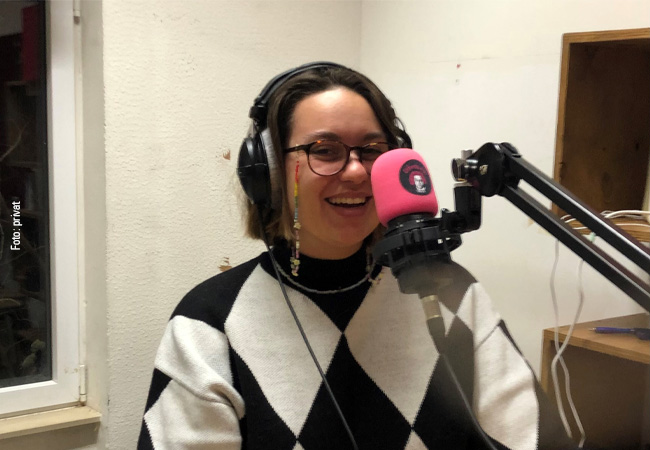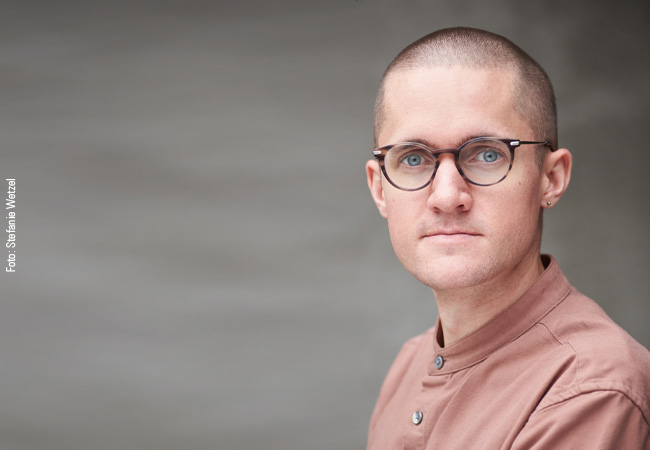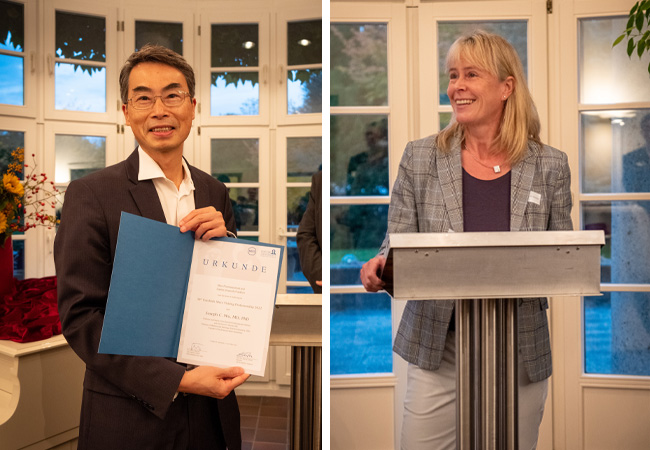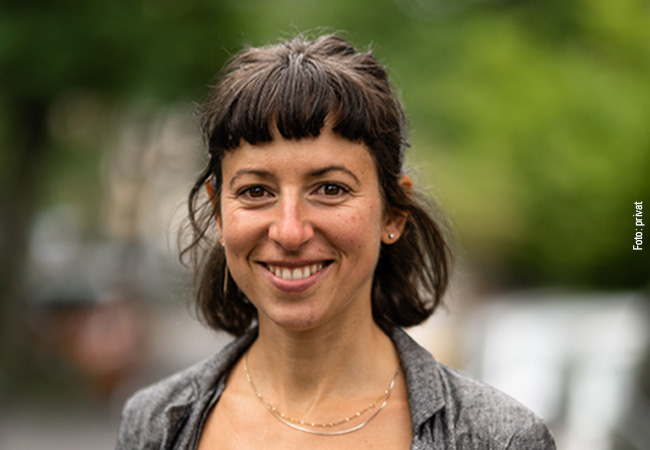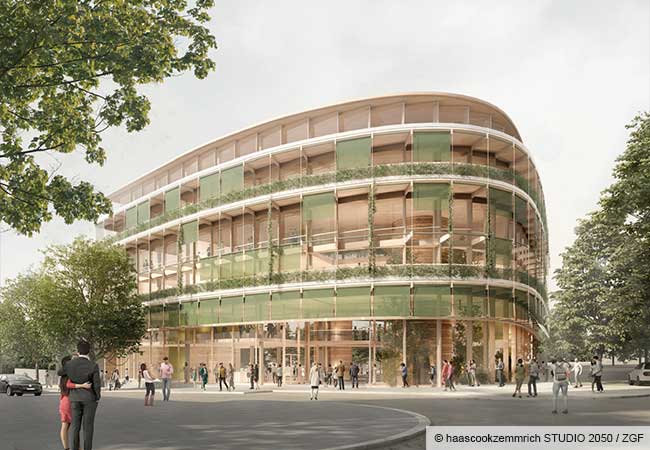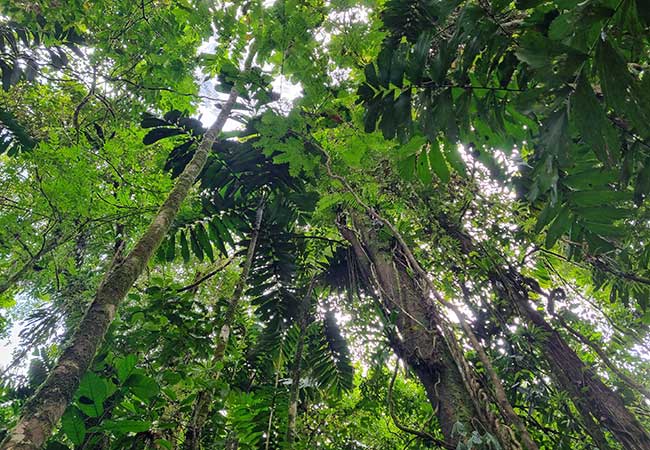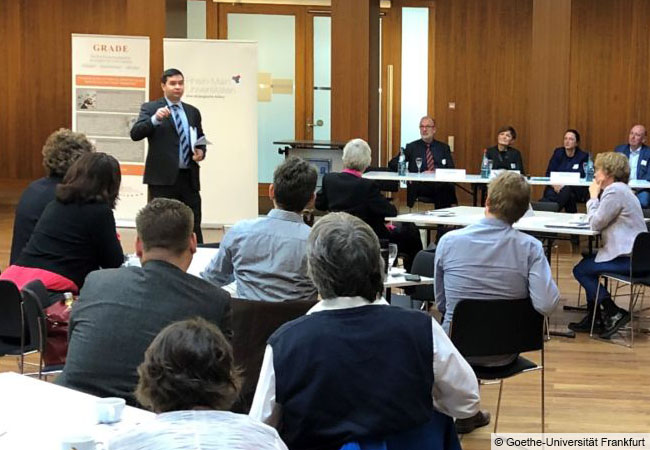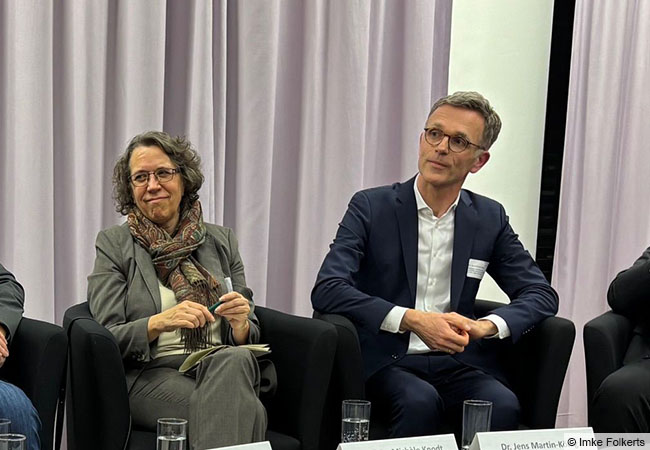When it comes to scientific information, digital does it – although the printed word remains popular, too.
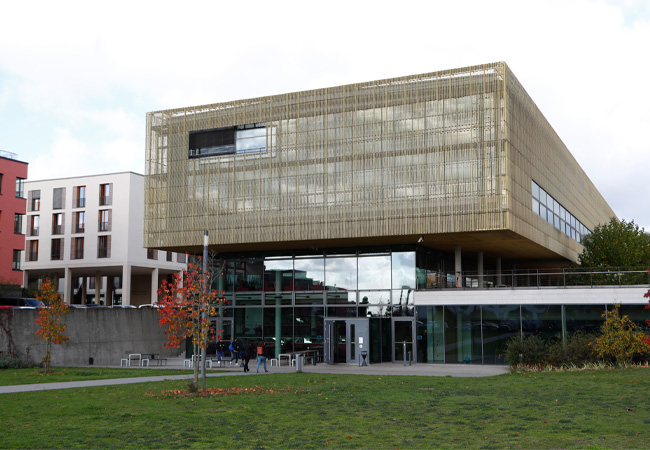
Digitization is well advanced in the natural sciences: researchers can usually access journals from their workplace or from home. That is why you will find mostly students in the Natural Sciences Library at Riedberg Campus’ Otto-Stern-Zentrum – who go there not only to work quietly by themselves but also to study together with their peers in group rooms. Here, too, visitors still like to use “old-school” chalk and blackboard to work on formulas.
Anyone visiting Goethe University’s Riedberg Campus for the first time will have no trouble finding the Natural Sciences Library, which is housed in the eye-catching Otto-Stern-Zentrum. Mocked by some, the building was once given the nickname “cheese grater” because of its structure and the golden color of its façade. In addition to a few lecture halls and a cafeteria, the building also and mostly accommodates the department library on Riedberg Campus. Library visitors are impressed first of all by the size of the light-flooded reading room. The façade lets in sufficient light – although, as the library’s management recounts, it took some tough wrangling to convince the architects (Gerber Architects, Dortmund) that a few windows in the eye-catching exterior would not ruin the building’s overall impression.
Mathematics and Computer Science are preparing to move
Heading the department library is Roland Wagner, who holds a doctoral degree in forestry and is also in charge of the Medical Library on Niederrad Campus as well as the Open Access Department at the University Library. Wagner’s deputy is Daniela Jatz, a qualified librarian, who has worked on Riedberg Campus since 1989. “At that time, the department library was still named after the Frankfurt suburb of Niederursel and sat on a bare slope, as it were,” she says. More and more disciplines joined the Chemistry Library until, in 2011, they moved into the new Otto-Stern-Zentrum. “As a result, we are very experienced in absorbing new stock,” Jatz says. Right now, Computer Science and Mathematics are missing – both libraries are still located on Bockenheim Campus. Even if the new building for these two subjects will take some more time to complete, the faculties are already deciding which stock will move to Riedberg Campus and which will be taken out of use or deposited in the Central Library.
New challenges
In general, Wagner says, people in the natural and life sciences are far less attached to printed media. “Important research findings are published in online journals. Scientists are pleased that they can access the latest research directly and without taking any detours on their computer in the office or at home. Nobody has to venture to the library for that anymore.” In former times, there were more encounters with researchers, Daniela Jatz recalls somewhat sorrowfully. “Now and again, a professor would come to the library to copy a newspaper article.” Today, communication largely takes place in the virtual domain. But, as Roland Wagner points out, new and different tasks and responsibilities have evolved – which are sometimes overlooked: “Researchers working from their offices often no longer realize that they are only able to access online content because the library works in the background to license it – for them, this information simply seems to ‘just’ be there. But there are complex legal, financial and also technical issues associated with e-journals and e-books.” Daniela Jatz adds: “Digital textbooks are often very expensive for the subjects taught on Riedberg Campus and can frequently only be purchased as a package – and then only for a certain length of time. For the publishers, this is a lucrative business, but the libraries have to deal with the problem of literature that is often only ‘rented’. What this means is that after a year, a digital book may no longer be available.”

That being said, it is hard to think of a profession on which digitization has had more of an impact than on the librarian’s job. “If at some point all journals are accessible via Open Access, licensing will also become obsolete. Other library services will be in greater demand, for which our staff naturally will have to undergo constant training,” explains Roland Wagner. Another important topic besides Open Access is research data management. “For the researchers on Riedberg Campus, the systematic handling of research data already plays a major role – in this respect, the humanities and social sciences still have more catching up to do.” As such, while a team at the University Library is seeking to find answers to the questions of how data can be recorded, stored, retained and used, the department libraries are increasingly assuming the role of mediator. If the acts of making literature available and providing lending services tie up fewer human resources, Roland Wagner says, then libraries will in future be able to offer even better support to researchers when it comes to publishing and research data management. “As information and scientific publications become more readily available online, finding your way through the flood of digital information and asking which materials have been checked in terms of their scientific quality and which have not will become more important.”
Physical textbooks remain popular
Digitization might be well advanced in scientific research. When it comes to students, the preferences differ, both Daniela Jatz und Roland Wagner emphasize. Although students like to use the important and underlying textbooks in natural and life sciences studies in a digital format, many still prefer to have them as physical books. “Printed books account for about 75 percent of our loans,” Daniela Jatz explains. Although e-books are convenient to use at home, textbooks of this kind can easily be 1,300 pages long, which makes reading on screen quite tiring. The Natural Sciences Library is proud to offer something that is unique in Frankfurt: in cooperation with the faculties, it facilitates “semester loans”. This means that a large number of copies of the most important textbooks are purchased, and students can borrow these for a whole semester. “As a rule, our students can only borrow textbooks for four weeks. Being able to offer semester loans eliminates the stress of having to return a book before they are finished with it – a service students appreciate and consider very attractive.”
The library as a center for learning and communication
Many students – also those pursuing disciplines outside the natural sciences – like to use the Natural Sciences Library as a place to learn because it allows not only private study. With ten workrooms, it is also possible to study and discuss in groups. The rooms can be booked online, but some can also be used on the spur of the moment without making a reservation. “This concept was developed together with the student councils, who emphasized the importance of flexible use,” says Daniela Jatz. Although the technical equipment in the rooms also includes optional beamers, the one item that is particularly popular is the whiteboard – not the interactive types but analogue ones that you write on with traditional felt-tip pens. “In subjects such as mathematics or chemistry, you have to work with formulas that can sometimes be very long and complex. That is one of the reasons why we still value analogue technology,” says Roland Wagner with a grin.
FACTS AND FIGURES ABOUT THE NATURAL SCIENCES LIBRARY
Subjects represented so far
• Geosciences and Geography (Faculty 11)
• Physics (Faculty 13)
• Biochemistry, Chemistry and Pharmacy (Faculty 14)
• Biological Sciences (Faculty 15)
Workplaces
• 300 reading places and workstations
• 10 group study rooms (some bookable)
• 1 workroom for visibly impaired persons
Stock
• Around 150,000 books and journals (capacity designed for 300,000 volumes)
Staff
• 7 library staff (mostly part-time)
• Supported by student assistants
Opening hours
Natural Sciences Library Reading Room
Monday to Friday, 8.00 – 20.00
Saturday 10.00 – 16.00
Group study rooms
Monday to Friday 8.00 – 22.30
Saturday, Sunday 10.00 – 19.00
Library website https://www.ub.uni-frankfurt.de/bnat


